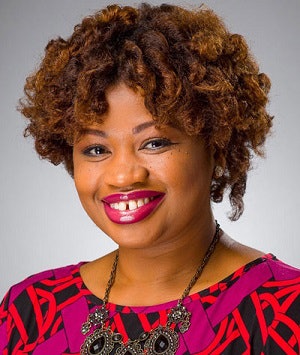Thanksgiving is one of my favorite holidays. Beyond my Mom’s macaroni that’s never phony, the endless parade of cousins and play cousins, and the nail-biter football matchups between both of my college alma maters and their arch rivals (Wahoowa and Go Bucks!), Thanksgiving brings together various threads of life that bring me joy.
In my family Thanksgiving has never been about pilgrims having a mythical dinner with Indian tribes they tried to eradicate. Instead, Thanksgiving provides an opportunity to show our gratitude for family, friendship and community. Over the last year, however, the mood in the United States has felt incredibly heavy. From mass acts of violence that have claimed the lives of innocent Americans to the more mundane political battles that amplify longstanding tensions, finding gratitude in this contentious political space seems elusive.
 Dr. Khalilah L. Brown-Dean
Dr. Khalilah L. Brown-DeanI spent election night 2018 at a television studio providing national texture on what would become an historic midterm election. As the returns began to pour in it became clear that we, collectively, were standing on the cusp of history. Voter turnout across the United States was exceptional reaching the highest level in nearly 100 years. According to data from the U.S. Election Project, 49.2 percent of eligible voters cast a ballot compared to just 37 percent in 2014. In key battleground states like Florida, Georgia, Texas and Virginia, voters from underrepresented communities navigated an increasingly complex maze of regulations to make their voices heard. Allegations of voter suppression made it clear that the Supreme Court’s 2013 gutting of the Voting Rights Act of 1965 disadvantaged the very people for whom the original act was intended to protect. According to a report issued by the Leadership Conference for Civil Rights, 868 polling places were closed in just a three year period. The overwhelming majority of those polling sites were located in communities of color with a long history of strong voter turnout. The calculated decision to shutter these polling places highlighted the persistent gap between the principle and the practical reality of achieving an open democracy.
Beyond who voted, the people for whom we voted also shattered previous barriers. When the 116th Congress is seated in January, it will usher in the most diverse federal legislature in U.S. history. Deb Haaland of New Mexico and Sharice Davids of Kansas will become the first two American Indian women to serve in the very legislative body where members voted against a provision in the landmark Violence Against Women Act aimed at protecting Native women. Native women experience sexual violence and domestic violence at rates that surpass women of all other racial and ethnic groups. Often the perpetrators of that violence are non-Indians over whom tribal governments have limited authority. The introduction of Haaland and Davids’ voices coupled with the profound ways new members like Ihlan Omar, Jahana Hayes and Marsha Blackburn challenge the status quo provide a glimmer of hope that we are in fact, making steps toward achieving a representative democracy.
I firmly believe our best opportunity to shape political outcomes is at the local and state levels. It’s where citizens can staff civilian review boards to demand accountability or elect prosecutors who understand being smart on crime is more valuable than simply being tough on crime. The election of Jared Polis as the country’s first openly gay governor highlight the power of possibility. To be sure, the significance of Polis’s election is greater than just his identity. Rather, it is an affirmation that he and the many other candidates who made history are able to transcend barriers to represent the best interests of their constituents. Being the first is laudable. Being the only is detrimental. The true test beyond the 2018 midterms comes in determining whether new pathways for representation and political engagement will endure beyond elections.
Much has been made of who voted in 2018 and the people for whom we voted. Equally important are the ballot measures for which we voted. Against the backdrop of having over 5 million people in this country permanently disenfranchised because of a past conviction, Florida voters struck down a centuries old felon disenfranchisement clause that rendered 1 in 3 Black and Brown men political pariah. Even as recounts invoked memories of the 2000 Presidential election that was separated by just 537 votes, Florida residents proved the fierce urgency to break the cycle of being once convicted and forever doomed.
In various states, like Missouri and Arkansas, voters decided that increasing the minimum wage was a necessary step to ensuring greater access to economic security. In a state like Arkansas where 27 percent of children live below the poverty line, protecting the rights of workers to earn a livable wage shows that covering basic needs shouldn’t be partisan. That’s why voters in four states supported a Medicaid expansion that covers an additional 300,000 Americans for whom health care has been treated as a luxury rather than a necessity. And so even in a capitalist climate that too often treats people as potential consumers, voters in Colorado approved a ballot measure that placed limits on the interests rates charged by predatory loan companies. Progress.
And so amid all the political uncertainty, incivility and seeming insanity that seems to dominate our twenty-four news cycle, I’m ruminating on the words of the late Congresswoman Barbara Jordan, “there is no executive order; there is no law that can require the American people to form a national community. This we must do as individuals and if we do it as individuals, there is no President of the United States who can veto that decision.” Give thanks.
Dr. Khalilah L. Brown-Dean is an associate professor of political science at Quinnipiac University where she writes about American Politics, political psychology and public policy. You can follow her on Twitter @KBDPHD




















